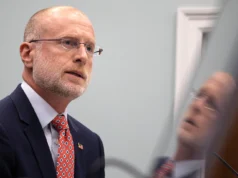
The Federal Trade Commission on Wednesday voted unanimously to ban marketers from using fake reviews, such as those generated with AI technology, and other misleading practices to promote their products and services.
All five FTC commissioners voted to adopt the final rule, which will go into effect 60 days after it is published in the Federal Register, the government’s official catalog of rules and notices.
Typically, rules are published within days of their adoption, meaning that consumers can expect to see the FTC’s fake-review ban go into effect starting in mid-October.
“Fake reviews not only waste people’s time and money but also pollute the marketplace and divert business away from honest competitors,” FTC Chair Lina Khan said in a statement.
Along with prohibiting reviews written by nonhumans, the FTC’s rule also forbids companies from paying for either positive or negative reviews to falsely boost or denigrate a product. It also forbids marketers from exaggerating their own influence by, for example, paying for bots to inflate their follower count.
Violations of the rule could result in fines being issued for each violation, according to the rule. This means that for an e-commerce site with hundreds of thousands of reviews, penalties for fake or manipulated reviews could quickly add up.
With the rise of e-commerce, influencer marketing and generative AI, more advertisers are turning to automated chatbots such as ChatGPT to quickly generate user reviews for products sold online.
The result: Consumers sometimes end up purchasing items based on false praise or misleading promises.
Fake reviews are already illegal, and some e-commerce companies have tried to push back on the deceptive marketing practice themselves.
Amazon, for example, sued more than 10,000 Facebook group administrators in July 2022 for allegedly brokering fake reviews.
Amazon did not immediately respond to CNBC’s request for comment on the FTC’s new rule.
Some of the biggest online review sites support the new rule.
“While Yelp’s policies have long prohibited practices outlined in the FTC’s final rule, we believe the enforcement of this new rule will improve the review landscape for consumers and help level the playing field for businesses,” Aaron Schur, general counsel for the major online review platform Yelp, said in a statement to CNBC.
Under the new rule, companies that might have policed themselves in the past will now be subject to stricter government oversight.
Rather than prosecuting individual cases through the Department of Justice, this rule will streamline and strengthen the FTC’s ability to enforce the ban in-house.
The announcement came the same day as the White House’s first “Creator Economy Conference,” during which Biden administration officials hosted 100 online influencers and digital content professionals to listen to concerns about the industry.
Disclaimer
The information contained in South Florida Reporter is for general information purposes only.
The South Florida Reporter assumes no responsibility for errors or omissions in the contents of the Service.
In no event shall the South Florida Reporter be liable for any special, direct, indirect, consequential, or incidental damages or any damages whatsoever, whether in an action of contract, negligence or other tort, arising out of or in connection with the use of the Service or the contents of the Service. The Company reserves the right to make additions, deletions, or modifications to the contents of the Service at any time without prior notice.
The Company does not warrant that the Service is free of viruses or other harmful components
This article originally appeared here and was republished with permission.












